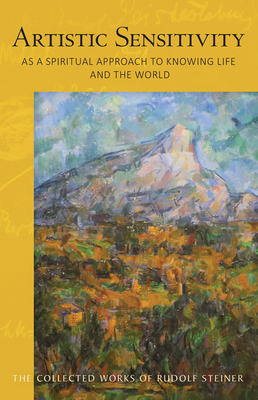Artistic Sensitivity as a Spiritual Approach to Knowing Life and the World: (Cw 161)

Artistic Sensitivity as a Spiritual Approach to Knowing Life and the World: (Cw 161)
13 lectures, Dornach, Switzerland, January 9 - May 2, 1915 (CW 161)"Simply learning the theory of spiritual science is not enough; what matters is having an inner experience of what we learn, and filling our souls with the impulses of spiritual science.... We must also attempt to really bring spiritual science to life, to really let it flow into what we undertake and intend to do. We need to become conscious of the fact that the spiritual-scientific worldview provides something that is meant to engender a new kind of human being in place of the old human being who has come down to us like an heirloom from an earlier stage of Earth evolution. As we do so, we begin to develop the preconditions in ourselves though spiritual science that will help give birth to what is to be born in the future on Earth." -- Rudolf Steiner (from the first lecture)Today's orthodox notions of science--which is to say, of knowing--are exceedingly narrow; they posit, implicitly or otherwise, that the only knowledge possible, if any, is that of the physical world. But the skeleton key to unlocking the door, behind which lies the root of the problems and difficulties of our age, and thus their solution, is to be able to fully answer this question: What is it to know something? This question lies at the foundation of spiritual science. Rudolf Steiner had first to solve it for himself, pointing the way for others to do the same (in, for example, his Philosophy of Freedom), long before he could give such lectures as these.Rudolf Steiner's work and words, still largely undiscovered as compared to their value for humanity, continue to point the way toward a different path--a way of knowing that encompasses the fullness, the breadth and depth of life and the worlds we inhabit. This knowing--which is to say, science--does not ignore or even contradict the narrower physical sciences of technologists and other specialists, but offers an expansive understanding of reality that also includes a deeper engagement with those aspects of our experience that we are told are beyond the ken of science. But is truth not accessible through art? Are poetry and literature, indeed the beauty and wisdom of each human language, not portals through which we can glimpse truths, every bit as real (though of a different order) than those we might grasp through a microscope?These thirteen lectures were given in Dornach, Switzerland, from January to May 1915, between the fifth and ninth months of World War I. G
PRP: 175.50 Lei
Acesta este Prețul Recomandat de Producător. Prețul de vânzare al produsului este afișat mai jos.
157.95Lei
157.95Lei
175.50 LeiLivrare in 2-4 saptamani
Descrierea produsului
13 lectures, Dornach, Switzerland, January 9 - May 2, 1915 (CW 161)"Simply learning the theory of spiritual science is not enough; what matters is having an inner experience of what we learn, and filling our souls with the impulses of spiritual science.... We must also attempt to really bring spiritual science to life, to really let it flow into what we undertake and intend to do. We need to become conscious of the fact that the spiritual-scientific worldview provides something that is meant to engender a new kind of human being in place of the old human being who has come down to us like an heirloom from an earlier stage of Earth evolution. As we do so, we begin to develop the preconditions in ourselves though spiritual science that will help give birth to what is to be born in the future on Earth." -- Rudolf Steiner (from the first lecture)Today's orthodox notions of science--which is to say, of knowing--are exceedingly narrow; they posit, implicitly or otherwise, that the only knowledge possible, if any, is that of the physical world. But the skeleton key to unlocking the door, behind which lies the root of the problems and difficulties of our age, and thus their solution, is to be able to fully answer this question: What is it to know something? This question lies at the foundation of spiritual science. Rudolf Steiner had first to solve it for himself, pointing the way for others to do the same (in, for example, his Philosophy of Freedom), long before he could give such lectures as these.Rudolf Steiner's work and words, still largely undiscovered as compared to their value for humanity, continue to point the way toward a different path--a way of knowing that encompasses the fullness, the breadth and depth of life and the worlds we inhabit. This knowing--which is to say, science--does not ignore or even contradict the narrower physical sciences of technologists and other specialists, but offers an expansive understanding of reality that also includes a deeper engagement with those aspects of our experience that we are told are beyond the ken of science. But is truth not accessible through art? Are poetry and literature, indeed the beauty and wisdom of each human language, not portals through which we can glimpse truths, every bit as real (though of a different order) than those we might grasp through a microscope?These thirteen lectures were given in Dornach, Switzerland, from January to May 1915, between the fifth and ninth months of World War I. G
Detaliile produsului










